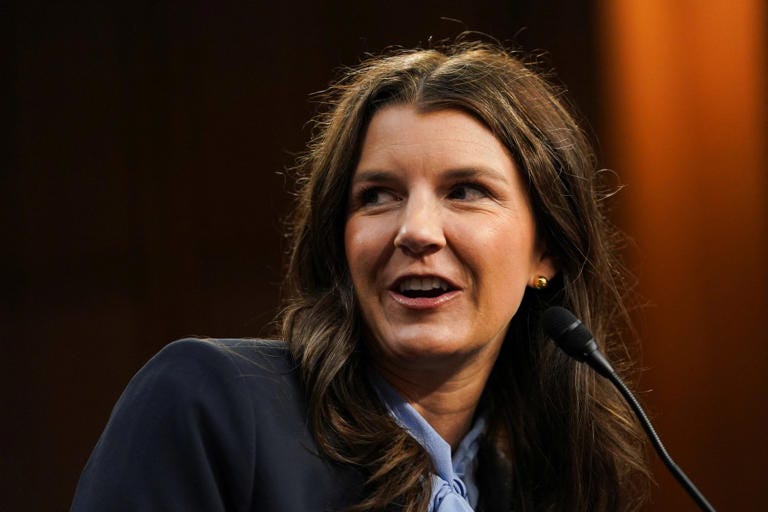Loyalty Over Law: Trump’s Judicial Pipeline and the Battle for the Bench
Emil Bove and the first batch of ideologues face confirmation later this month
When Emil Bove sat before the Senate Judiciary Committee last month, he embodied more than just another federal judicial nominee. As a former lead prosecutor, Trump defense lawyer, and enforcer of some of the administration’s most controversial Justice Department decisions, Bove represents something new on the federal bench: a nominee whose primary credential seems to be loyalty to one man rather than to the law.
In the weeks since, Bove’s nomination has sparked outrage from former prosecutors, civil‑rights advocates, and senators alike. But he is not an anomaly. He is part of a slate of nominees moving through the Senate, each with troubling histories and ideological commitments that could shape the courts and the lives of millions for decades.
This is not just about one judge or one vacancy. It is about who we allow to inherit the power of the bench, and how much ideology we’re willing to tolerate in our most supposedly impartial institution.
We just hit 17,000 subscribers—thank you!
Get exclusive access for just $1/week or $52 a year.
Get exclusive analysis and fearless reporting you won’t find in corporate media.
Why Are These Seats Open?
It’s easy to imagine a more sinister explanation, that the judiciary is being artificially expanded or packed with loyalists out of nowhere. But the truth is more mundane: these vacancies were created the way most are, through the natural churn of the courts.
When federal judges meet certain age and service milestones, they have the option to take what’s called senior status. It’s a kind of semi‑retirement: they keep their title, their chambers, and even their full salary, but they free up their seat for a successor while continuing to hear cases at a reduced workload. Many also volunteer to take on overflow work from other courts, easing the pressure of packed dockets.
Far from creating turf wars, senior status is designed to help, preserving the wisdom of experienced judges while allowing new voices to step in. In fact, without senior judges, many federal courts would grind to a halt under the sheer weight of their caseloads.
The openings being filled now, including the one Emil Bove hopes to occupy, were left by judges who took senior status or retired outright. In the months ahead, more are expected to follow, opening yet more opportunities for Trump to leave his mark on the bench.
See our earlier reporting on Trump and the courts here:
Note: These articles are more than 45 days old and now live in the archive. Consider becoming a paid subscriber for full access to the nearly 800 article archive and exclusive perks.
The Nominees: Who They Are
Emil Bove: Loyalty Over Law
Emil Bove is the face of Trump’s judicial strategy, someone whose career has been built on fierce loyalty, ambition, and a willingness to sidestep established norms. A Georgetown Law grad and former clerk, Bove rose through the ranks of the U.S. Attorney’s Office in Manhattan, eventually leading its Terrorism & International Narcotics Unit. His reputation there was mixed: respected for prosecutorial skill, yet criticized for abrasive management. Internal reviews even recommended his demotion.
After representing Trump in the hush-money case and other legal battles, Bove landed a powerful DOJ role as Acting Deputy Attorney General. He defended Trump-aligned allies, fought corruption charges on behalf of a former New York mayor, and reportedly ordered prosecutors and FBI agents to stand down when they pursued investigations contrary to Trump’s interests.
You can read our earlier reporting on his role in dismissing the Mayor Adams corruption case here:
Note: This article is more than 45 days old and now lives in the archive. Consider becoming a paid subscriber for access to the full nearly 800 article archive and exclusive perks.
Whistleblowers say he urged the defiance of a federal court in an immigration case, backed up by a damning text that read: “Guess it’s time to find out on the ‘fuck you.’”
Senator Dick Durbin said these messages “underscore deep concerns” and “prove that the DOJ misled a federal court and disregarded a court order.”
Now he’s nominated to the 3rd Circuit Court of Appeals, which covers Pennsylvania, New Jersey, Delaware, and the U.S. Virgin Islands, filling a seat opened when Judge Joseph Greenaway took senior status. His committee vote is set for July 17, with a full Senate vote to follow if he advances.
Whitney Hermandorfer: Quiet On Obedience, Loud on Ideology
Hermandorfer, 37, is Trump’s pick for the 6th Circuit, which spans Kentucky, Michigan, Ohio, and Tennessee. A University of Virginia Law graduate, she spent years with the Tennessee AG’s office, defending near-total abortion bans and litigating against Title X family-planning regulations.
At her hearing, she appeared hesitant to affirm that presidents must follow court orders, a concern flagged by numerous watchdogs. Balls & Strikes concluded she “demonstrated zero interest in restraining the lawlessness of the Trump administration.” The Leadership Conference on Civil and Human Rights called her nomination “an attempt to further stack the courts with ideological loyalists who cannot be trusted to uphold the rule of law.”
Her Senate supporters, meanwhile, praise her defense work and describe her as an expert litigator. Her full Senate vote is expected on July 14.
Maria Lanahan: Missouri’s Ideological Enforcer
Lanahan serves as Missouri’s principal deputy solicitor general and holds a law degree from Notre Dame. With only about twelve years of legal experience, she has aggressively litigated to restrict mifepristone and defend conversion therapy, placing her squarely in the ideological camp. A coalition called Accountable.US said, “Trump judicial nominees … are leading the charge to overturn the will of Missourians and eliminate their fundamental freedoms.”
Senate Democrats also flagged her low experience level and pointed to her leadership in high-profile anti-abortion litigation. Her confirmation hearing took place on June 4, and she cleared the committee on June 26.
Zachary Bluestone: Conservative Warrior
A Harvard Law alumnus and Federalist Society member, Bluestone is running for a seat in the Eastern District of Missouri after clerking on the D.C. Circuit. He backed Brett Kavanaugh during his bruising Supreme Court confirmation, despite credible allegations of sexual assault, and his record shows consistent support for anti‑worker, anti‑climate, and pro‑gun positions.
While he downplayed his Federalist Society connections under questioning, watchdog groups remain skeptical of his impartiality. His nomination advanced out of committee on June 26.
Cristian Stevens: Evasion as Doctrine
The third Missouri nominee, Stevens, another Federalist Society member, brings experience as a state appellate judge and as a long‑time conservative legal advocate. But during questioning, he dodged the central issue: whether presidents and executive officials are bound by court orders. He offered abstract hypotheticals instead, leaving senators unconvinced about his respect for the rule of law.
Each of these nominees is heading into routine vacancies, left behind by judges who chose senior status. But individually and collectively, their records suggest a more profound transformation: filling the federal judiciary with individuals bound not to the Constitution, but to a political ideology.
A Timeline of This First Wave
The five current nominees were announced on May 28, filling seats vacated by judges who retired or assumed senior status. Hearings for the district court nominees Lanahan, Bluestone, and Stevens, as well as Hermandorfer, were held in early June. Emil Bove, whose record drew the most scrutiny, had his hearing on June 25, where his text messages and whistleblower allegations became public.
On June 26, the Senate Judiciary Committee advanced Hermandorfer, Lanahan, Bluestone, and Stevens. Only Bove was held back, with his committee vote scheduled for July 17, after additional documents and testimony were reviewed.
This is only the opening act. More vacancies are expected to follow as judges step into senior status later this year.
Why This Matters
The five nominees moving through the Senate this summer were chosen to fill ordinary vacancies. Judges retire. They take senior status. The system keeps moving. On the surface, nothing unusual is happening.
But look closer, and the story changes. These aren’t simply experienced jurists stepping in to keep the courts running. They are ideologues, some with thin résumés, some with troubling records of hostility toward civil rights, women’s health, workers’ protections, and even the very idea that a president is bound by law.
Their appointments come at a time when public trust in the courts has already eroded, and the stakes of federal rulings have never been higher. These judges don’t just decide arcane procedural questions. They decide who can vote, who can marry, who can control their own body, who can organize a union, who can access medicine, and who is protected from discrimination.
It’s one thing to fill routine vacancies. It’s another to weaponize those vacancies to entrench a political project and undermine the independence of the courts.
What’s Next
For readers watching closely:
Monday, July 14: Full Senate vote on Whitney Hermandorfer.
Thursday, July 17: Committee vote on Emil Bove.
Later in July: Floor votes for Lanahan, Bluestone, and Stevens.
Beyond these five, more vacancies will open this year, giving Trump additional opportunities to shape the judiciary for decades to come.
If you care about the independence of the courts and the rule of law, now is the time to pay attention and to speak up. Contact your senators. Share what you’ve learned. Let others know that what happens this summer may define federal law and individual rights for a generation.
Closing
Judicial nominations rarely make headlines. They happen quietly, against a backdrop of legal jargon and procedural votes. But beneath that quiet is a revolution, a deliberate effort to fill the federal bench with loyalists who see the courts not as a check on power but as an extension of it.
This summer’s nominees illustrate the danger: a moment when ordinary vacancies are filled in extraordinary ways, with extraordinary consequences.
We will continue tracking these votes and future nominations here, because the courts are too important to cede to politics without a fight.
We just hit 17,000 subscribers—thank you!
Get exclusive access for just $1/week or $52 a year.
Get exclusive analysis and fearless reporting you won’t find in corporate media.
Bibliography:
“Democrats Release Texts, Emails to Boost Claims Trump Nominee Urged Defiance of Courts.” Reuters, July 10, 2025.
“Former D.C. U.S. Prosecutors Oppose Emil Bove Appeals Court Nomination.” Washington Post, July 8, 2025.
“The Judiciary Committee’s Emil Bove Hearing Was a Travesty.” The Guardian, July 3, 2025.
“The Leadership Conference Opposes the Nomination of Whitney Hermandorfer to the U.S. Court of Appeals for the Sixth Circuit.” The Leadership Conference on Civil and Human Rights, June 2025.
“Whitney Hermandorfer Hearing: Trump Nominee Dodges Questions on Rule of Law.” Balls & Strikes, June 2025.
“Accountable.US Statement on Trump Judicial Nominees Joshua Divine and Maria Lanahan Steamrolling Missouri Voters and Advancing a Statewide Abortion Ban.” Accountable.US, June 4, 2025.
“Judiciary Committee Advances Judicial Nominations for Sixth Circuit and Missouri District Courts, U.S. Attorney Nominations for Idaho and Pennsylvania.” Senator Chuck Grassley – Press Release, June 26, 2025.
“Leader Schumer Floor Remarks Opposing the Nomination of Whitney Hermandorfer to Be a Judge for the 6th Circuit and President Trump’s Pattern of Nominating Unqualified Loyalist Judges.” Senate Democrats, July 2025.
“Trump Lawyer Pressed Over ‘F*** You’ Whistleblower Court Claim During Bove Hearing.” The Daily Beast, June 25, 2025.
“AFJ Opposes Entire First Slate of Trump Judicial Nominees.” Alliance for Justice, May 28, 2025.
“Zachary Bluestone.” Alliance for Justice, Accessed July 2025.
“Whitney Hermandorfer.” Alliance for Justice, Accessed July 2025.
“Judge Cristian Stevens.” Alliance for Justice, Accessed July 2025.
“Maria Lanahan.” Alliance for Justice, Accessed July 2025.
“Emil Bove.” Alliance for Justice, Accessed July 2025.













Wow, so much damage to democracy in such a short time. The revision and repair will take more time.
The judges are expected to decide whether the rule of the law applies.